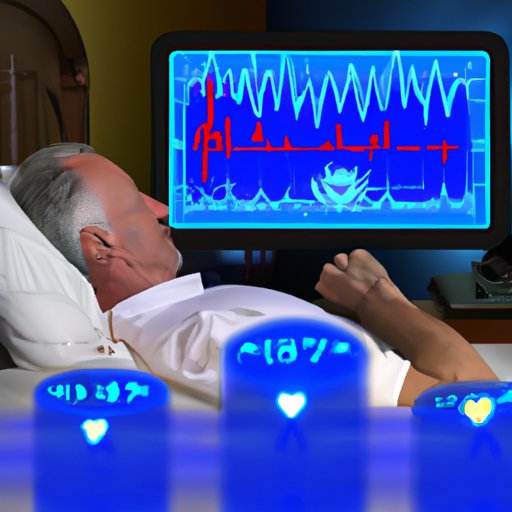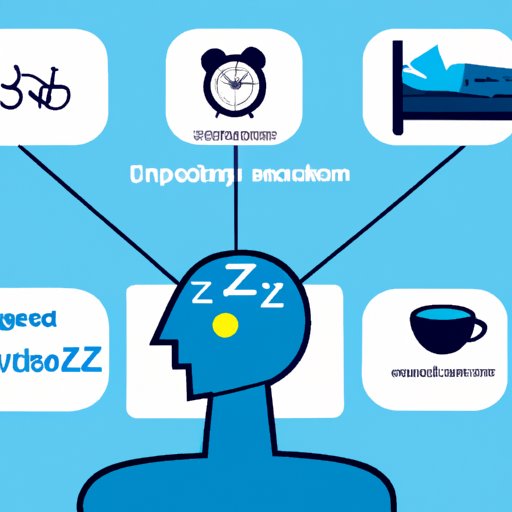Introduction
In his book Why We Sleep, renowned sleep scientist Matthew Walker argues that sleep is essential for both physical and mental wellbeing. Despite this, many people are not getting enough restful sleep. This article explores the science behind why we sleep, its relevance to readers, and how they can make changes to ensure they get the quality sleep they need.
Exploring the Scientific Benefits of Sleep
Sleep plays an important role in physical health. Research suggests that getting enough quality sleep can help reduce the risk of developing chronic illnesses such as heart disease, diabetes, and obesity. A lack of sleep has also been linked with an increased risk of stroke and other cardiovascular problems. In addition, studies have shown that inadequate sleep can impair the immune system, making it more difficult for the body to fight off infections and illnesses.
Sleep also has a significant impact on mental health. Studies have found that poor sleep can lead to feelings of depression and anxiety, as well as impairing cognitive performance. Additionally, research suggests that getting enough sleep can help improve mood, reduce stress levels, and increase alertness. In fact, one study found that participants who got eight hours of sleep per night reported higher levels of happiness than those who slept fewer hours.
Sleep also plays an important role in cognitive performance. Studies have found that adequate sleep helps to improve concentration, focus, and memory recall. Furthermore, research suggests that getting enough sleep can help enhance creativity and problem-solving skills. One study even found that participants who got eight hours of sleep scored higher on tests of creativity and analytical thinking than those who slept for six hours or less.
Examining the Neuroscience Behind Why We Sleep
In order to understand why we sleep, it is important to explore the neuroscience behind it. Sleep is divided into two main categories: non-rapid eye movement (NREM) sleep and rapid eye movement (REM) sleep. NREM sleep consists of four stages, progressing from light sleep to deep sleep. During these stages, the body repairs itself and prepares for the next day. REM sleep is when most of our dreaming occurs and is believed to be important for processing information and consolidating memories.
Circadian rhythms are also important for understanding why we sleep. These are internal biological clocks that regulate the body’s daily cycles. They are responsible for controlling when we feel sleepy and when we feel alert. The circadian rhythm is largely driven by exposure to light and darkness, so it is important to maintain regular sleep patterns in order to ensure the body functions optimally.
Finally, hormones play an important role in regulating sleep. The hormone melatonin is released in response to darkness and helps to induce sleepiness. Cortisol is another hormone that is involved in the sleep cycle, as it helps to regulate alertness. When cortisol levels are high, it indicates that the body is in a state of wakefulness, while low cortisol levels indicate that the body is ready for sleep.

An Overview of the Health Consequences of Poor Sleep
Not getting enough sleep can have serious consequences for both physical and mental health. Studies have shown that inadequate sleep can increase the risk of developing chronic illnesses such as heart disease, diabetes, and obesity. It can also lead to fatigue, irritability, and difficulty concentrating. Poor sleep can also affect mood, leading to feelings of depression and anxiety.
Sleep deprivation is also linked to an increased risk of motor vehicle accidents due to impaired reaction time and decision-making abilities. Furthermore, research suggests that poor sleep can increase the risk of developing certain types of cancer, such as breast and prostate cancer. Finally, studies have found that inadequate sleep can lead to an increased risk of mortality.
Understanding the Role of Sleep in Memory and Learning
Sleep plays an important role in memory and learning. During sleep, the brain processes and consolidates information, helping to store memories in the long-term. Studies have found that getting enough sleep can help improve memory recall and enhance performance on challenging tasks. It can also help to enhance creativity and problem-solving skills.
Sleep is also important for learning new skills. Studies have found that getting enough sleep can help to improve motor skills and enhance performance on complex tasks. It can also help to improve academic performance, as research suggests that students who get enough sleep tend to achieve higher grades than those who do not.
A Review of Matthew Walker’s Argument for the Necessity of Sleep
In his book Why We Sleep, Matthew Walker makes a compelling argument for why sleep is essential for both physical and mental wellbeing. He cites a range of scientific evidence to support his claim, including studies that show how inadequate sleep can lead to an increased risk of developing chronic illnesses and impair cognitive performance. He also highlights the importance of sleep for memory consolidation and emotional regulation.
Walker goes on to suggest that modern society is failing to recognize the importance of sleep. He argues that our 24/7 culture is having a detrimental effect on our health and wellbeing, and that we need to prioritize sleep if we want to live healthier, happier lives. He advocates for a shift in attitudes towards sleep, suggesting that we should view it as an essential part of our daily routine rather than a luxury.

Exploring the Relationship Between Sleep and Mental Health
Sleep plays an important role in mental health. Studies have found that getting enough sleep can help reduce stress levels and improve mood. It can also help to regulate emotions, as research suggests that inadequate sleep can lead to difficulty controlling negative emotions. Additionally, studies have found that poor sleep can increase the risk of developing depression and anxiety.
It is also important to consider how sleep can affect our relationships. Research suggests that inadequate sleep can lead to difficulties in communication and interpersonal interactions. Furthermore, studies have found that couples who sleep together tend to report higher levels of satisfaction in their relationship than those who sleep apart.

Investigating the Impact of Technology on Sleep Quality
Technology can have a significant impact on sleep quality. The blue light emitted from devices such as smartphones and laptops can disrupt the body’s natural circadian rhythms, making it more difficult to fall asleep and stay asleep. Additionally, using electronic devices before bed can increase alertness and make it harder to relax.
However, there are some potential benefits of technology when it comes to sleep. For example, apps such as Calm and Headspace can provide guided relaxation exercises that can help to induce sleep. Additionally, there are devices available that track sleep cycles and provide feedback on how to improve sleep quality.
In order to ensure good sleep quality, it is important to manage technology use. This includes limiting the amount of time spent using devices before bed and ensuring that devices are kept away from the bedroom. Additionally, it is important to establish a regular sleep routine and create a technology-free environment in the bedroom.
Conclusion
This article has explored the science behind why we sleep and its relevance to physical and mental wellbeing. It has highlighted the importance of sleep for physical health, mental health, cognitive performance, memory and learning, and the impact of technology on sleep quality. Finally, it has looked at Matthew Walker’s argument for why sleep is essential and the implications of his argument for modern society.
It is clear that sleep plays an important role in maintaining physical and mental wellbeing, and it is essential that we prioritize it in our daily lives. By making small changes to our lifestyle and taking steps to ensure we get enough quality sleep, we can make a positive difference to our health and wellbeing.
(Note: Is this article not meeting your expectations? Do you have knowledge or insights to share? Unlock new opportunities and expand your reach by joining our authors team. Click Registration to join us and share your expertise with our readers.)
